5 Best eCommerce Platforms 2023 + How to Choose the Right One

Are you searching for the best eCommerce platform to help you launch an online store in 2023 and beyond?
In this post, we’ve collected the absolute best eCommerce platforms for all types of stores.
Rather than trying to hit you with every single eCommerce platform in existence, we curated our list to only focus on the five best options for most people.
Here’s each provider in a single sentence:
- 👉 Shopify – a SaaS eCommerce platform that does everything at least pretty well; it’s our overall top pick for most people looking to make an eCommerce store.
- 👉 WooCommerce – an open-source, self-hosted eCommerce tool powered by WordPress. It gives you maximum flexibility (but at the expense of some simplicity).
- 👉 BigCommerce – a dedicated SaaS eCommerce platform that works well for more advanced users who want multi-channel selling or headless commerce.
- 👉 Wix – a SaaS website builder that offers fairly powerful eCommerce features; a good option for people who want to add an eCommerce store as just part of a site.
- 👉 Squarespace – the same basic details as Wix, but with more of a creative aesthetic. If you sell the type of products that do well on Etsy, Squarespace could be for you.
We’ll dig into each platform in more detail so that you can learn exactly how it functions.
Then, once we’ve shared details on all of those eCommerce solutions, we’ll make some recommendations for a range of different eCommerce use cases.
If you’re in a rush, here are our picks for various situations (but we encourage you to read the full post to learn why we made those recommendations):
- 🥇 Best for most stores – 🏆 Our pick: Shopify
- 🏪 Best for small business or startups – 🏆 Our pick: Shopify
- 🏗️ Best for maximum flexibility – 🏆 Our pick: WooCommerce
- 🎚️ Best for multi-channel selling – 🏆 Our picks: BigCommerce or Shopify
- ✈️ Best for dropshipping – 🏆 Our picks: Shopify or WooCommerce
- 🛍️ Best for small, casual stores – 🏆 Our picks: Squarespace, Shopify, or Wix
- 🌎 Best for international sales – 🏆 Our picks: WooCommerce or Shopify
- 🤯 Best for headless commerce – 🏆 Our pick: BigCommerce
- 💼 Best for B2B selling – 🏆 Our picks: WooCommerce, BigCommerce, or Shopify
- 📓 Best for adding a store to an existing site – 🏆 Our picks: WooCommerce, Squarespace, or Wix
Let’s get started!
Introducing the Best eCommerce Platforms
Before we get into more details, let’s go over a quick introduction to the five platforms that we’ve chosen to feature.
Shopify
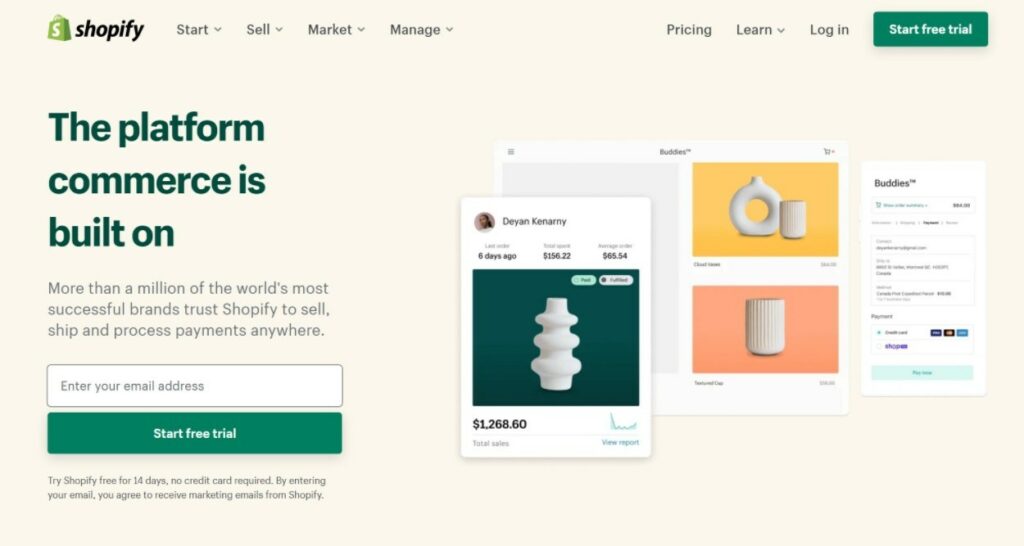
When most people think of the best eCommerce platforms, Shopify is probably the first name to come to mind.
It’s a hosted, SaaS eCommerce platform, which means that Shopify takes care of all the technical details for you. You never need to worry about security, maintenance, updates, and so on. Instead, you can just focus on growing your store.
For enterprise-level stores, Shopify also offers a flexible (and expensive) platform called Shopify Plus.
WooCommerce
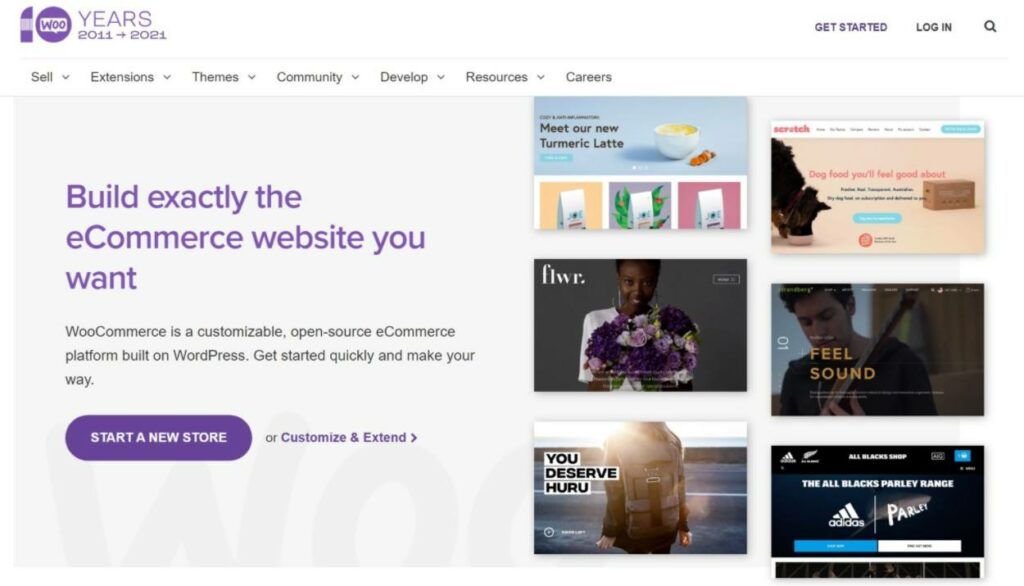
By the numbers, WooCommerce is the most popular eCommerce platform in BuiltWith’s index of the top one million websites by traffic, even beating out Shopify (though Shopify pulls ahead if you only look at the top 100k or top 10k sites).
Unlike all of the other eCommerce platforms on this list, WooCommerce is not a standalone SaaS tool. Instead, it’s built on top of the open-source WordPress software.
This has some pros and cons that we’ll discuss when we go more in-depth.
BigCommerce
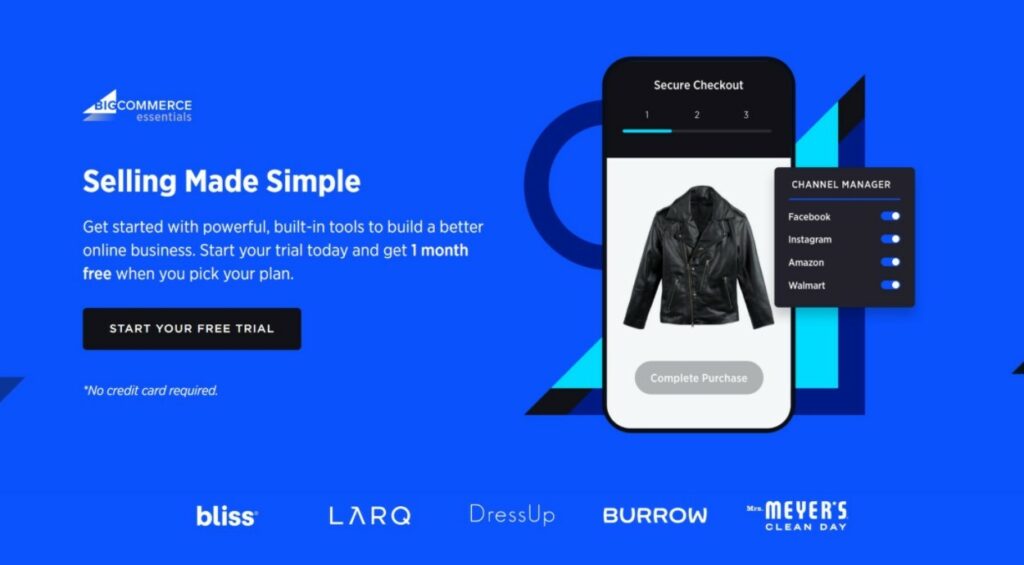
BigCommerce is another popular SaaS eCommerce platform that has the same basic approach as Shopify. There are two versions – a simple Essentials plan that’s targeted towards smaller sellers and requires zero technical knowledge, as well as a higher-powered Enterprise version.
In addition to offering a traditional eCommerce experience where you choose a theme and build your store via BigCommerce, it also supports headless commerce.
With the “headless” approach, you can essentially use BigCommerce to power your store’s backend while fully customizing your store’s frontend experience with whatever code stack you prefer, including dedicated plugins for WordPress and Drupal.
Wix

Wix is a popular website builder that you can use to build any type of website, including an eCommerce store.
If you’re looking to add eCommerce functionality as part of a website rather than as the website’s sole focus, you might prefer this multipurpose approach because you can build your site using Wix and then add eCommerce functionality where needed.
While it is a hosted website builder, Wix does a good job of giving you access to code tools and APIs so that you can customize your store if needed.
Squarespace

Squarespace is another popular website builder that also offers dedicated eCommerce platforms. Like Wix, Squarespace is not 100% focused on eCommerce, so it’s a great option if you want to add eCommerce functionality as part of a site.
Squarespace is especially popular with creatives, so you’ll see a lot of people using it to sell the type of products you’d see on Etsy. With that being said, there’s nothing stopping you from using Squarespace in other niches, as well.
Exploring These eCommerce Platforms in Detail
Now, let’s dig into these platforms in more detail. But first, we want to share a quick note about how we structured these hands-on sections.
For this post, we want to help you understand how these platforms function at a high level and what each tool does well or poorly.
Because an eCommerce platform is such a complex unit with tons of features, it’s impossible to cover every single feature in these platforms without writing a book.
If you have a very specific feature need, like an integration with some specific payment gateway, we recommend using this post as a jumping-off point to dig deeper into the feature lists of the platforms that seem like they’ll meet your needs.
With that out of the way, let’s get started…
1. Shopify
| Overall | Ease of Use | Features | Themes | Apps | Pricing/Value |
| 4.9* | 5 | 5 | 5 | 5 | 4.5 |
*Nobody’s perfect 😂
Basic Approach
Shopify is a SaaS eCommerce platform. Essentially, this means that Shopify fully handles all of the technical aspects of your store including security, maintenance, and updates. However, it also means that you can’t fully access your store’s underlying code, which is the main tradeoff you make in exchange for Shopify’s simplicity.
Still, for most people, especially non-technical users, this SaaS approach is great because it means you can focus on growing your store instead of messing around with technical details.
Shopify’s core software offers all of the foundational eCommerce features that you need. But then, if you want to customize your store, you can add new features with apps.
Overall, Shopify is popular because it’s very simple while still giving you access to all of the features and flexibility that most stores will need.
Interface Experience
Shopify gives you a user-friendly dashboard to manage all aspects of your store. It looks something like this:
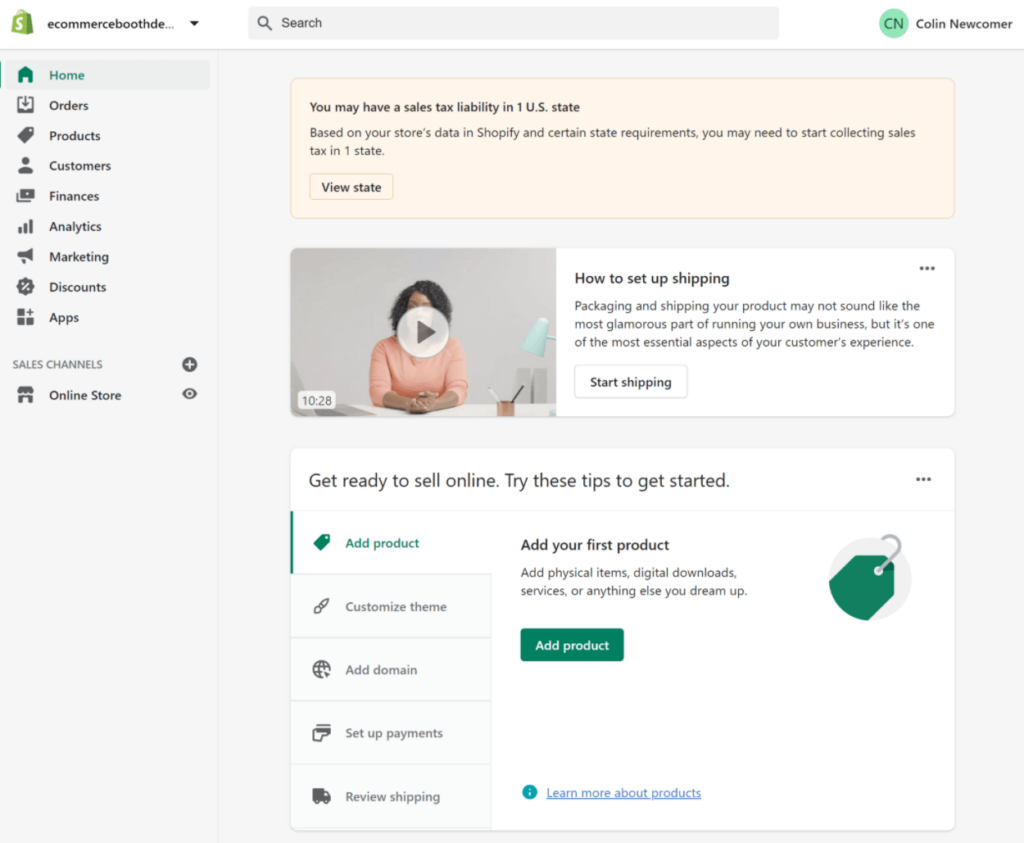
To add products, you’ll get a simple editor like this:
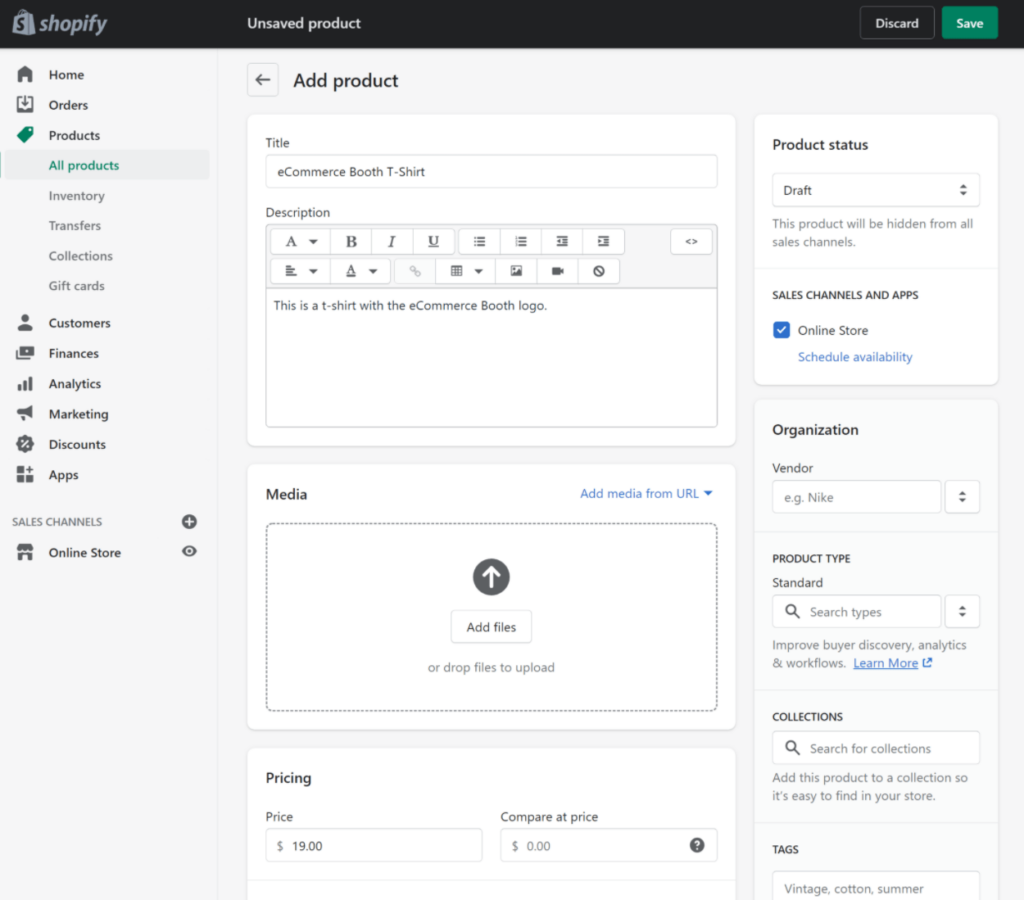
You’ll get other areas to manage your store’s…
- Customers
- Orders
- Finances
- Analytics
- Marketing
- Coupons
- Apps
- …and so on
To set up nitty-gritty details like taxes and shipping rates, you can use the full settings area:
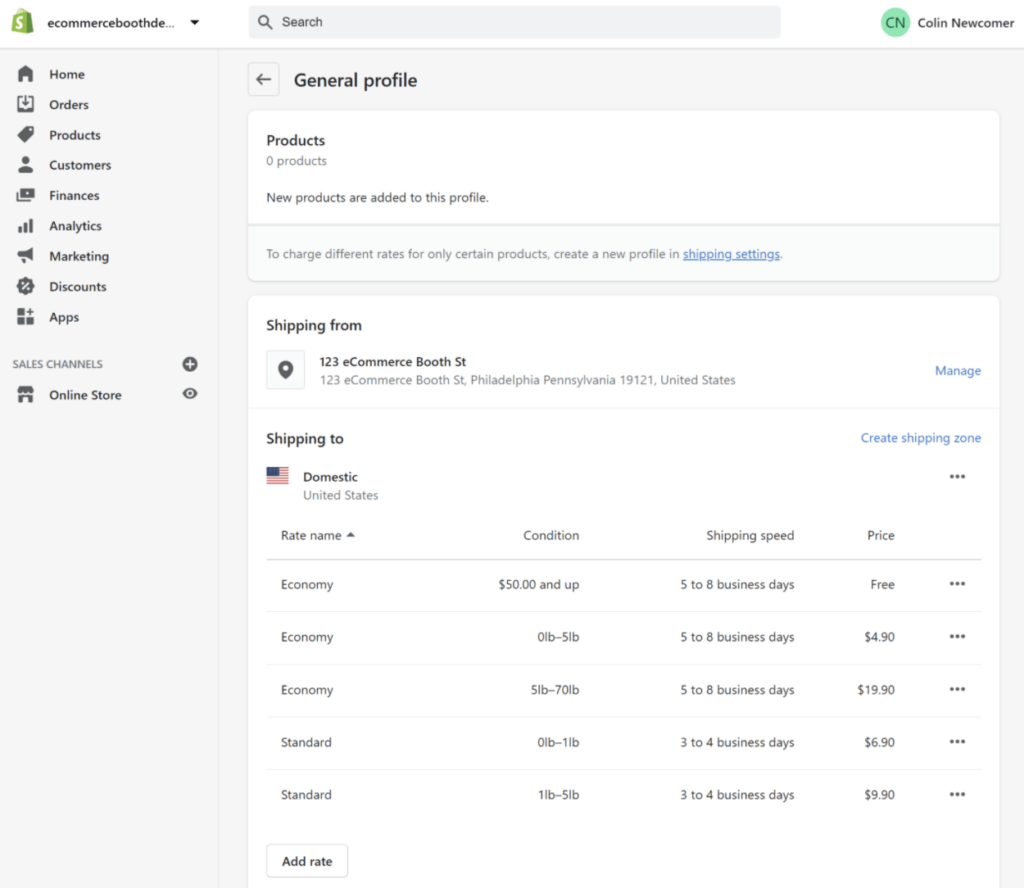
Themes/Templates
Shopify is quite flexible when it comes to themes. You can find hundreds of free or paid themes in the official Shopify theme marketplace.
To customize your theme, you’ll get a visual editor, though you can’t drag-and-drop elements on the visual preview (you need to use the sidebar):
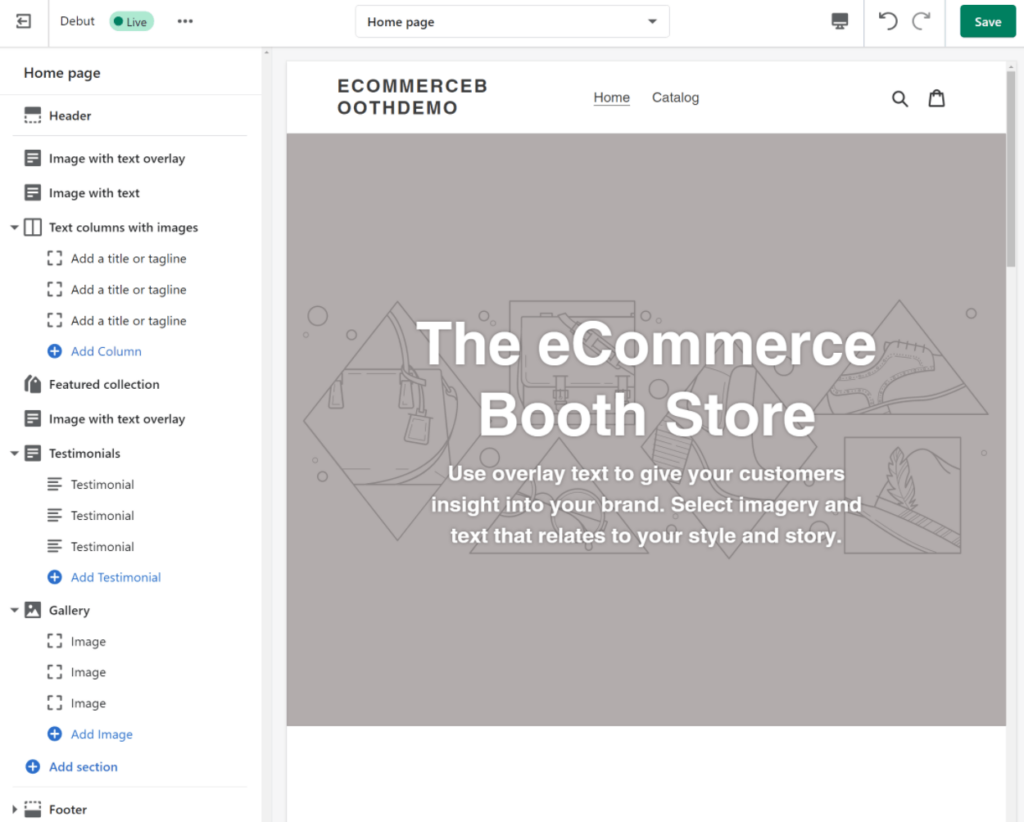
You can also purchase themes from third-party marketplaces like ThemeForest or independent sellers.
To see some of our favorites, check out our collection of the best Shopify themes.
Apps/Plugins and Integrations
Shopify has a huge and popular app marketplace, which is a big advantage of the platform. It’s the only platform that can rival WordPress and WooCommerce in terms of extensions and integrations.
Support
Shopify has a very good support policy. You get 24/7 support via email, live chat, or phone.
There’s also a community support forum and a detailed knowledge base.
Pricing
Shopify has three core pricing plans, starting at $29 per month. There’s also a 14-day free trial to test it out (no credit card required):
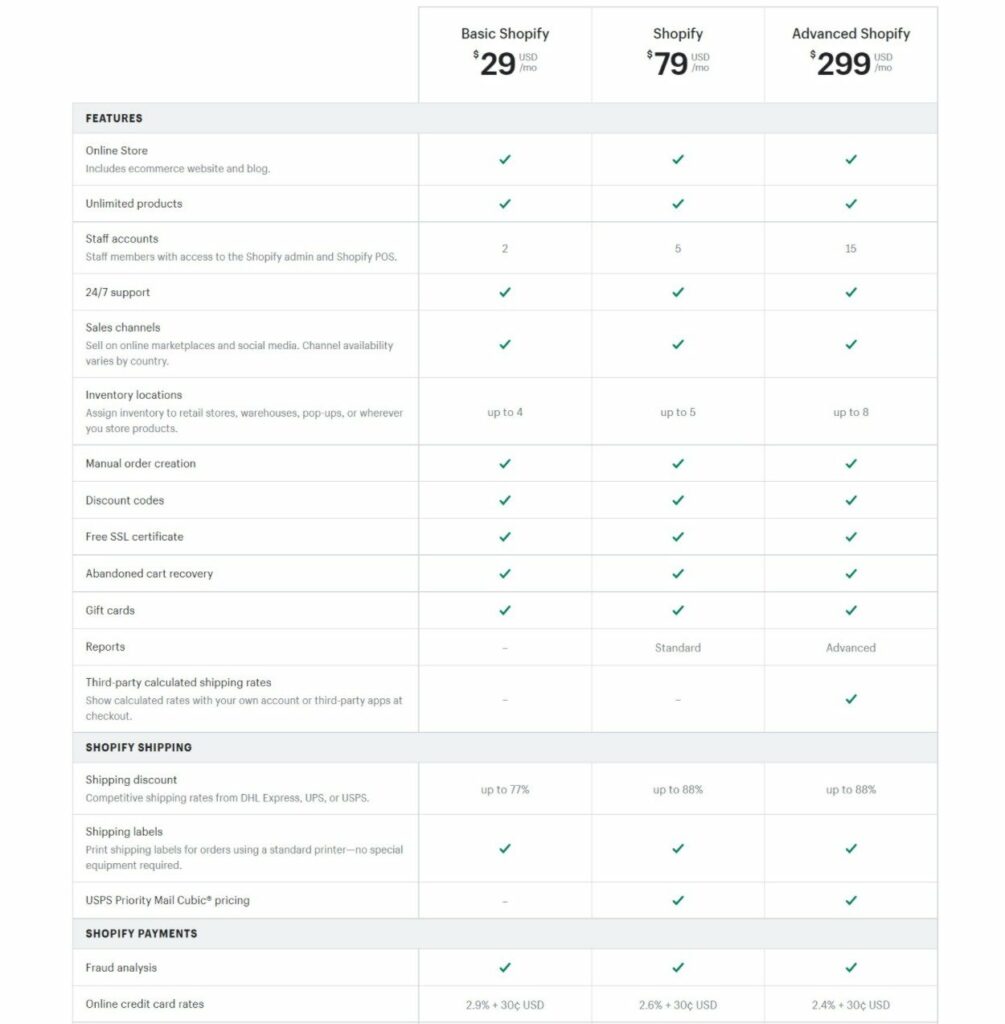
Beyond the fee for Shopify itself, you also might want to purchase a premium Shopify theme (a one-time fee) and premium Shopify apps (typically a recurring monthly fee).
If you use a lot of premium apps, your expenses can quickly go up.
Another pricing detail to note is that Shopify charges an extra transaction fee if you use a payment processor outside of Shopify Payments. This transaction fee varies depending on the plan. For example, if you want to accept PayPal on the Basic Shopify plan, Shopify will charge an extra 2.0% on top of PayPal’s processing fee.
Beyond the three core Shopify pricing plans, there’s also a Shopify Lite plan that works for very simple selling, but doesn’t give you a dedicated store.
For more enterprise-grade solutions, there’s Shopify Plus, which starts at $2,000 per month and gives you access to more advanced features like headless commerce and B2B sales.
Pros
- Shopify does everything at least pretty well. It’s a great all-around tool.
- Shopify handles all of the maintenance and security for you.
- There’s a huge app marketplace to extend your store and integrate with services.
Cons
- Shopify charges an extra transaction fee if you use a third-party payment gateway like PayPal.
- The non-eCommerce features can be weak. For example, while Shopify lets you create a blog, it’s pretty limited.
2. WooCommerce
| Overall | Ease of Use | Features | Themes | Apps | Pricing/Value |
| 4.5 | 3 | 5 | 5 | 5 | 4.5 |
Basic Approach
WooCommerce is a free, self-hosted, open-source eCommerce solution that’s built on top of the massively popular open-source WordPress software.
In order to use WooCommerce, you’ll first need to purchase your own web hosting and install the WordPress software. Then, you can install WooCommerce as a plugin for WordPress.
Because you’re self-hosting the software, you’ll be fully responsible for your site’s maintenance and security (or you can pay someone to do it for you). These tasks are actually fairly simple, so they shouldn’t scare you off. But WooCommerce definitely puts the most responsibility on your shoulders in those areas, which is something to consider.
The benefit of taking on that added responsibility is that you have full access to your store’s underlying code, which makes WooCommerce a great option for people who value flexibility and/or stores with unique needs.
If you want to turn WooCommerce into more of a “hosted eCommerce platform” approach like Shopify, you can use WordPress.com’s eCommerce plan instead of self-hosting the WooCommerce software. WordPress.com handles all the technical details while still giving you almost all of the flexibility of a self-hosted WooCommerce store.
To see it in action, check out our WooCommerce tutorial.
Interface Experience
Because WooCommerce is a WordPress plugin, you’ll manage your store directly from your WordPress dashboard. If you’re not familiar with WordPress, the WordPress dashboard looks like this:
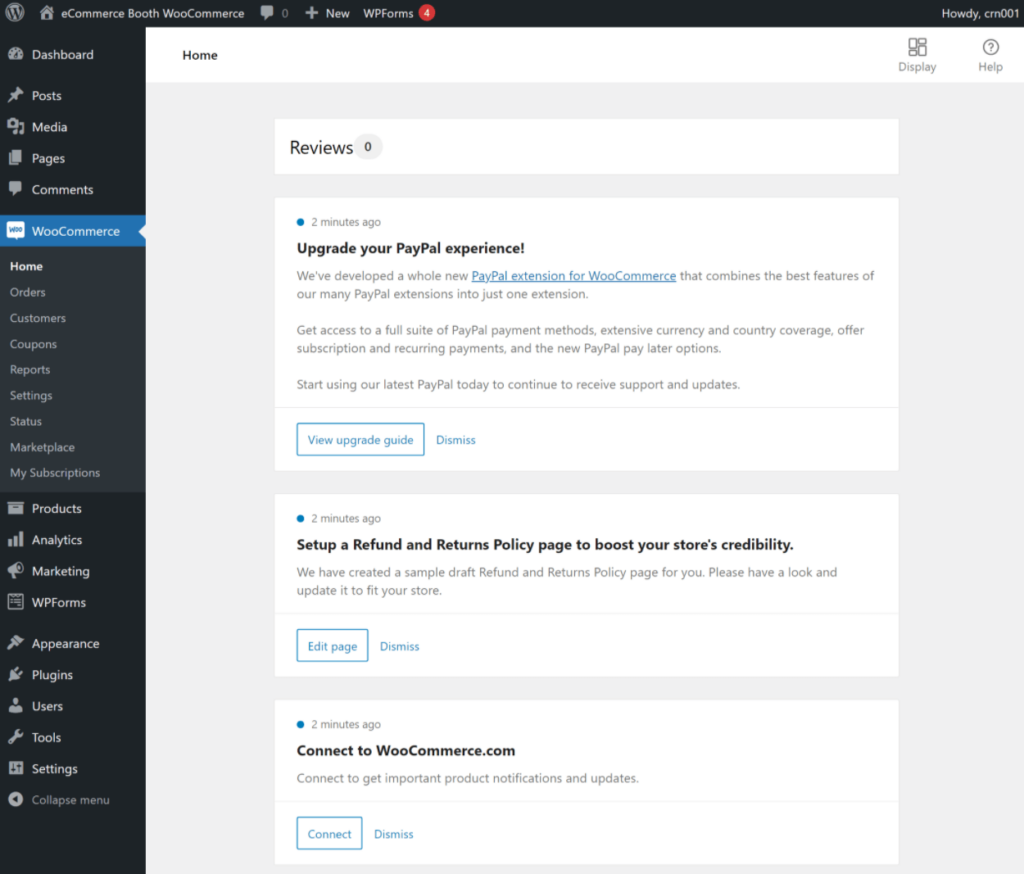
To add products, you can use the standard WordPress editor, but with some unique twists for WooCommerce:
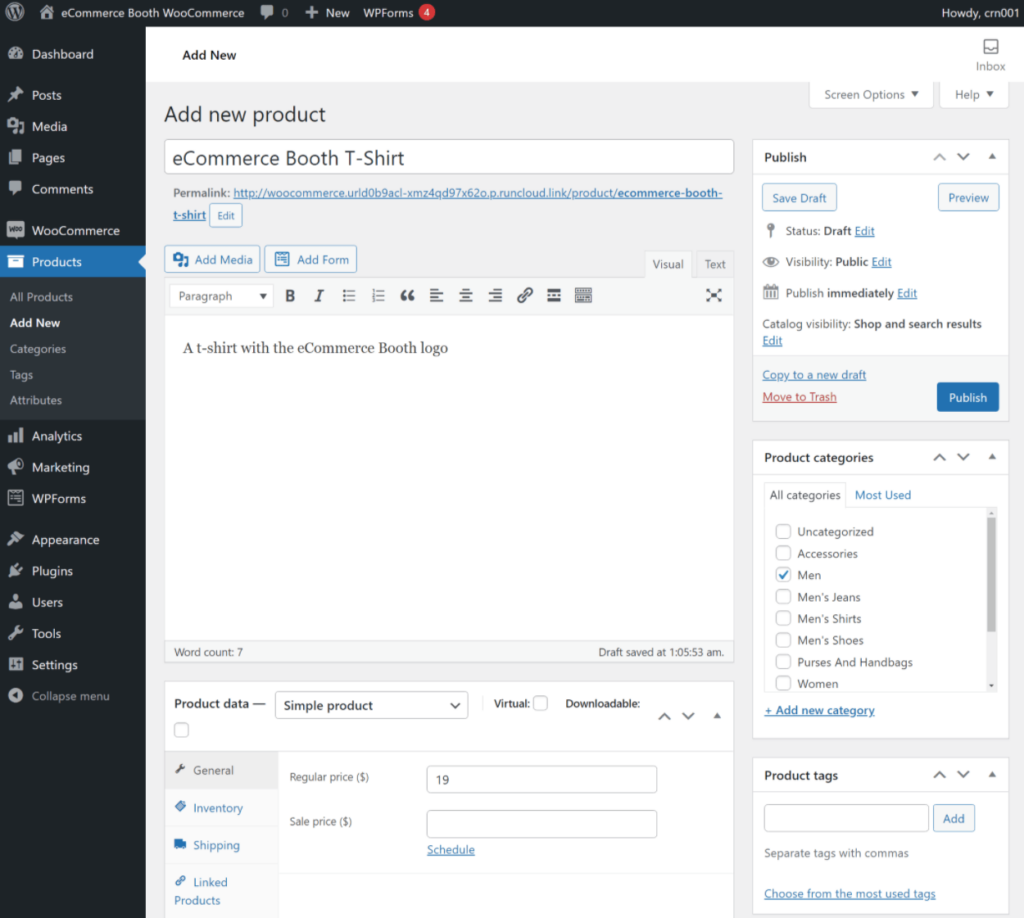
You’ll also get separate dashboards to manage your customers, orders, sales data, settings, and so on:
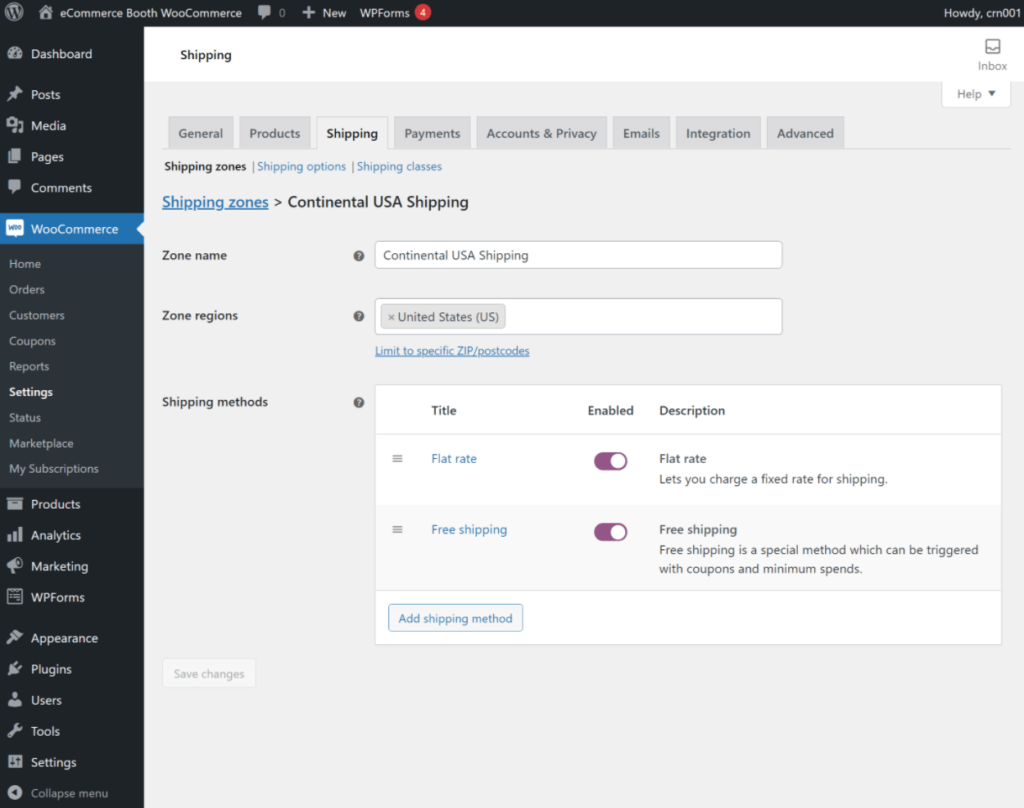
Themes/Templates
Themes are a big strong point for WooCommerce. You can find thousands of free and premium WordPress themes that offer full support for WooCommerce, so you’re really spoiled for choice and you should have no issues finding the perfect designs.
To see some great options, check out our collections:
To customize your theme, you can use WordPress’s built-in theme customizer or some WooCommerce themes offer integrations with visual, drag-and-drop design plugins, which offers a lot of flexibility:
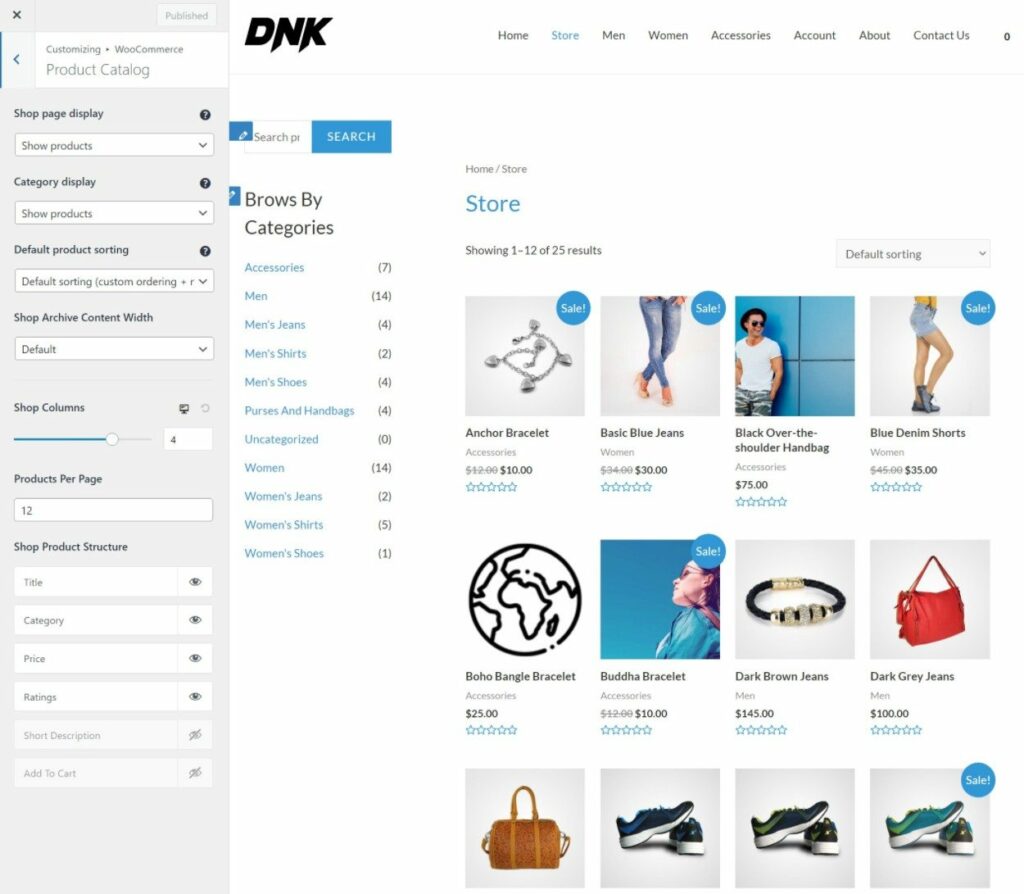
Apps/Plugins and Integrations
Plugins and integrations are another advantage of using WooCommerce and WordPress. With the exception of Shopify, no other eCommerce platform comes close to the number of plugins and integrations that WooCommerce offers.
You can find 58,000+ free WordPress plugins at WordPress.org and you’ll find thousands more from independent sellers or marketplaces like CodeCanyon.
Support
Because WooCommerce is free and open-source, there’s no official on-demand support team. That is, there’s no “WooCommerce support” via live chat or phone. However, you do still have a lot of options for getting help when needed.
First off, because WordPress and WooCommerce are so popular, it’s very easy to find community support. There are tons of forums, Facebook groups, blogs, and so on that all have active communities of people who will help you with issues.
Additionally, while WooCommerce itself doesn’t offer dedicated support, a lot of the plugins that you use for your WooCommerce store do offer support. That means you can reach out directly to support whenever you need help with a plugin that you’re using.
Pricing
The WordPress software and the WooCommerce plugin are both 100% free and open-source. However, there are other associated costs if you want to create a functioning WooCommerce store.
The biggest one is hosting to power the WordPress and WooCommerce software. For small stores, you might be able to get by with $10/month hosting, but most busy stores will need higher-powered hosting that costs $30+ per month (or even into the hundreds per month for very busy stores).
Beyond that, you also might want a premium WooCommerce theme and you’ll certainly want some premium WooCommerce plugins. A premium theme will cost you ~$60 and you should budget at least $250+ per year for plugins.
Put it all together and you could run a very simple WooCommerce store for as little ~$120 per year, but a more realistic cost for a moderately busy store is something like ~$1,000 per year for hosting, theme, and plugins.
Pros
- WooCommerce gives you maximum flexibility because of its huge plugin library and the fact that you get full access to your store’s underlying code.
- Because WooCommerce is built on WordPress, it excels at non-eCommerce functions like blogging or adding other types of content to your site.
- WooCommerce can be very cheap for a basic store if you’re on a budget.
Cons
- Because it’s self-hosted, you’ll be responsible for security and maintenance (unless you use WordPress.com’s eCommerce plan).
- While WooCommerce has the potential to be very affordable, it can also be more expensive than other platforms in some situations if you need high-powered hosting and lots of premium plugins. It really depends on your situation.
- No official live chat/phone support channel – need to rely on community support or third parties.
3. BigCommerce
| Overall | Ease of Use | Features | Themes | Apps | Pricing/Value |
| 4.5 | 4 | 4.5 | 4 | 4.5 | 4.5 |
Basic Approach
While BigCommerce is a SaaS tool, it’s pretty flexible in how it approaches creating a store.
First off, you can use it just like Shopify, where you sign up for an account and let BigCommerce handle everything for you. But where it’s different than Shopify* is that BigCommerce also makes it easy to use a “headless” approach.
With a headless commerce approach, you use BigCommerce to handle your store’s backend and then you can use any technology to create your frontend store. We know that this sounds complicated, and it certainly can be. However, it doesn’t have to be complicated.
For example, BigCommerce offers an official WordPress plugin that lets you use BigCommerce as a headless commerce solution with WordPress. BigCommerce will handle all the backend details, as well as key pages like your checkout. But for everything else, you can use WordPress. You can even find BigCommerce WordPress themes
BigCommerce also excels at multi-channel selling, which means that it makes it easy to add other sales channels such as Amazon and eBay.
If these features don’t interest you, you should probably just stick with Shopify. But if they do, BigCommerce might be a better SaaS eCommerce platform for your situation.
*Shopify does allow headless commerce on the enterprise-focused Shopify Plus plans, but not on its regular plans.
Interface Experience
Like Shopify, BigCommerce offers a really well-designed dashboard to manage your store. The main BigCommerce dashboard looks like this:
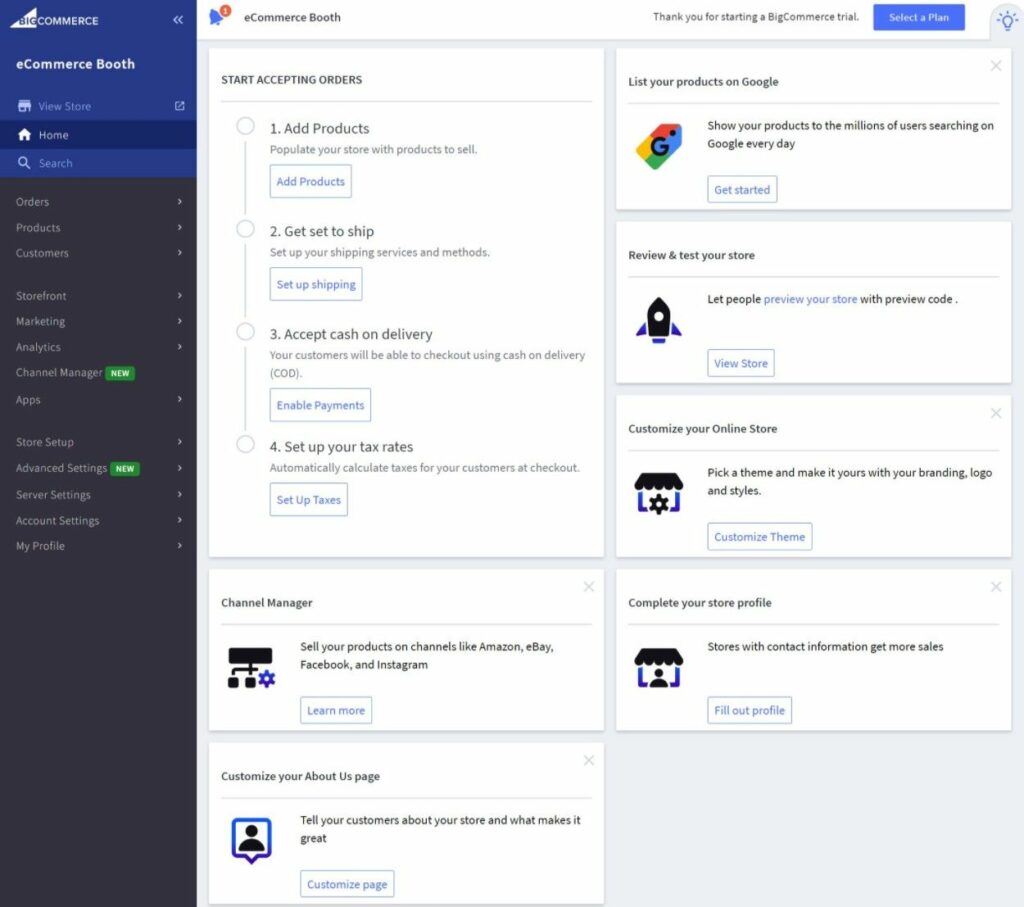
To add products, you can use an interface like this:
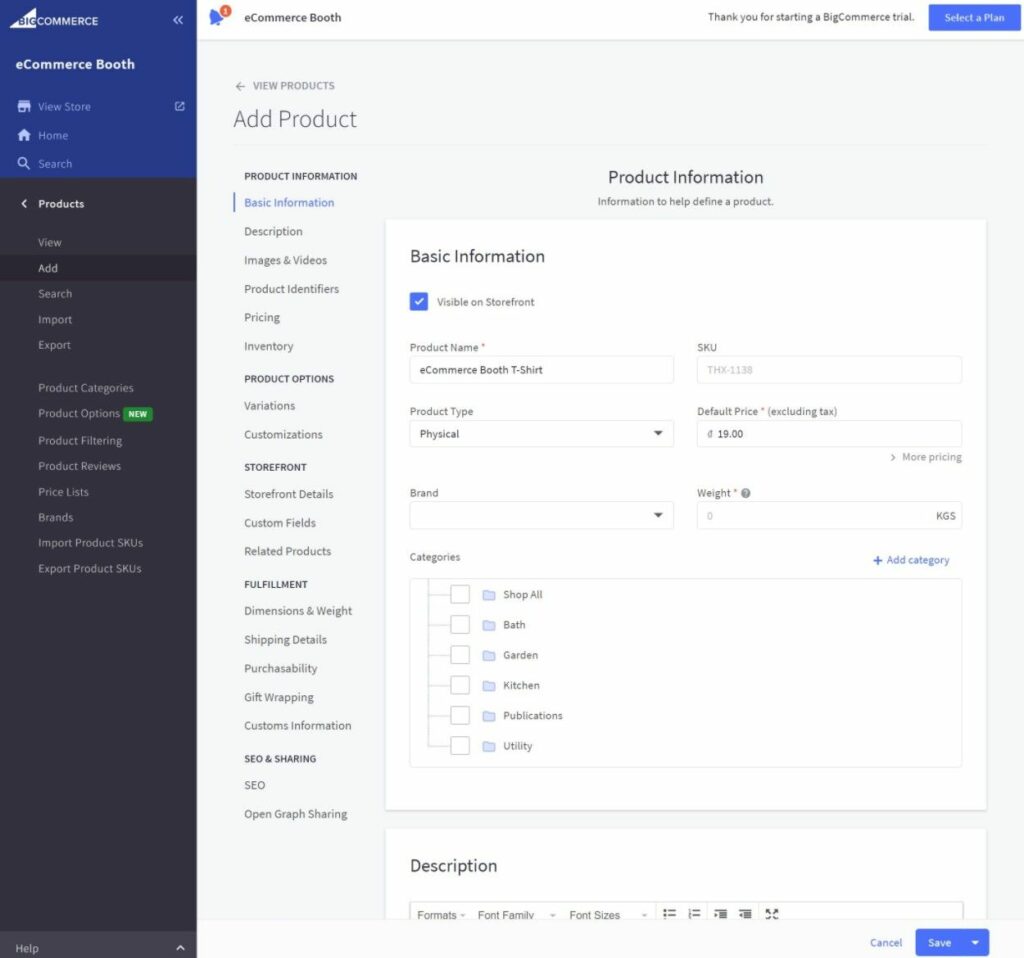
If you want to set up multi-channel selling, you get a dedicated Channel Manager area:
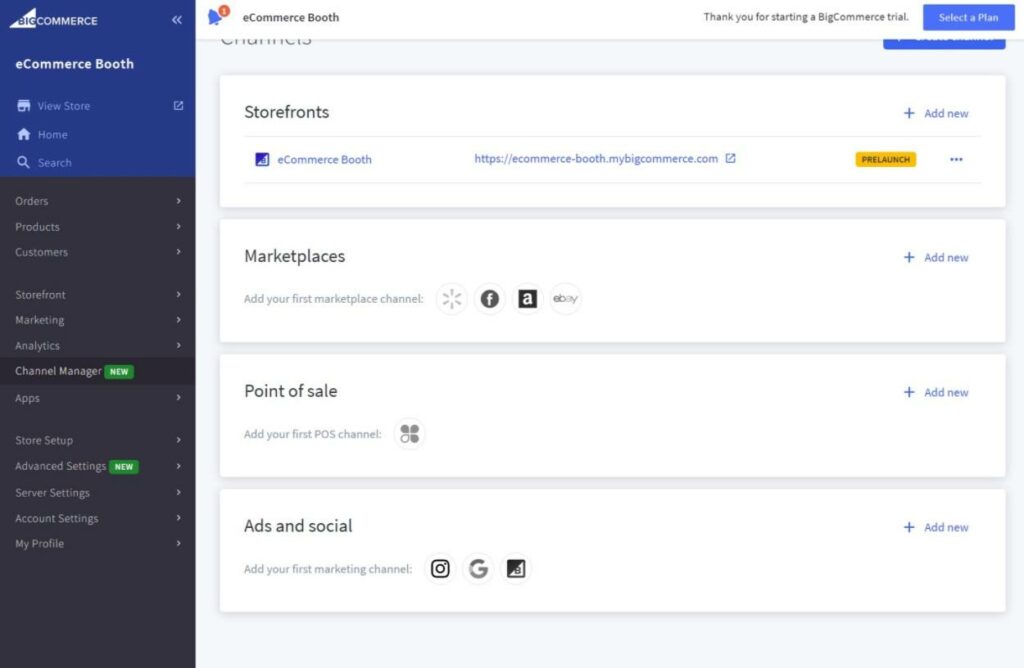
When you add a new channel, you can choose from a range of options:
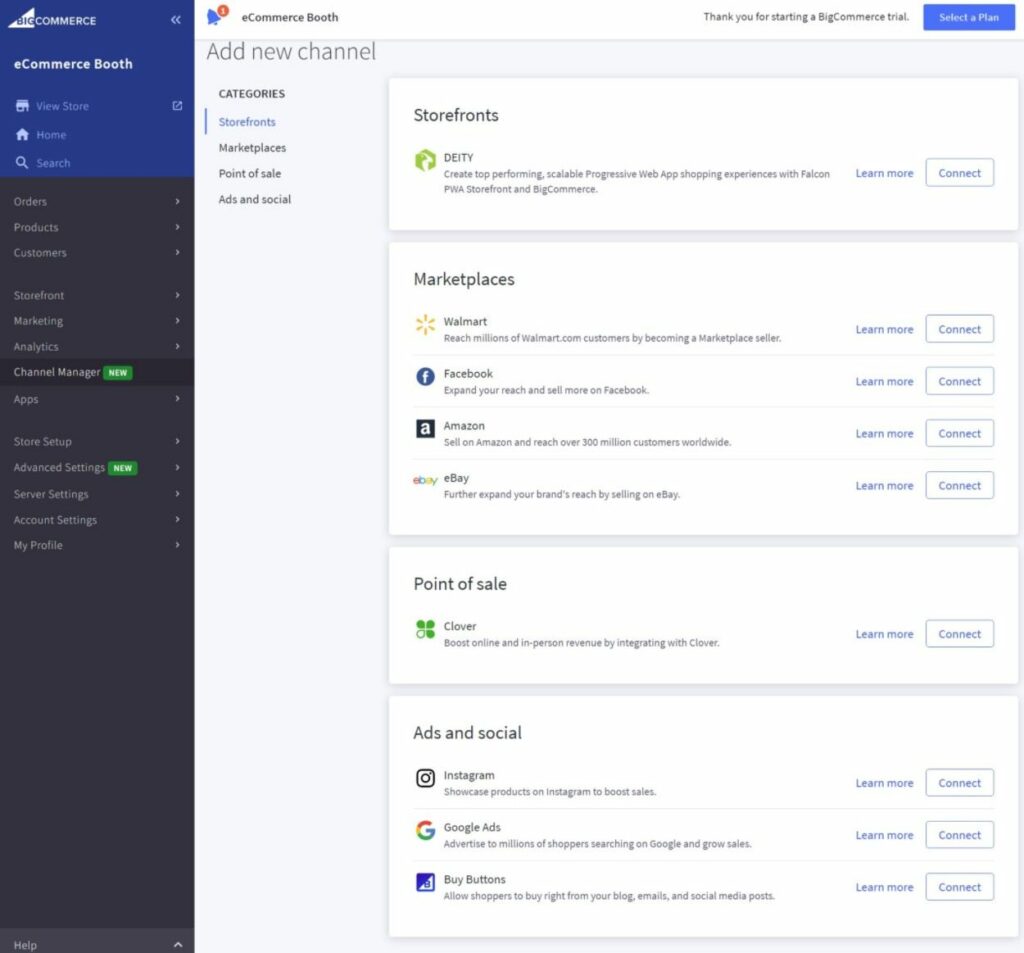
You’ll also get other areas to manage your orders, customers, analytics, settings, and so on.
Themes/Templates
BigCommerce gives you a few ways to control the design of your store.
First, if you’re using the “normal” approach, BigCommerce maintains an official theme directory of free and paid options. To customize your theme, you’ll get a drag-and-drop page builder. It’s not super fancy, but it gets the job done:
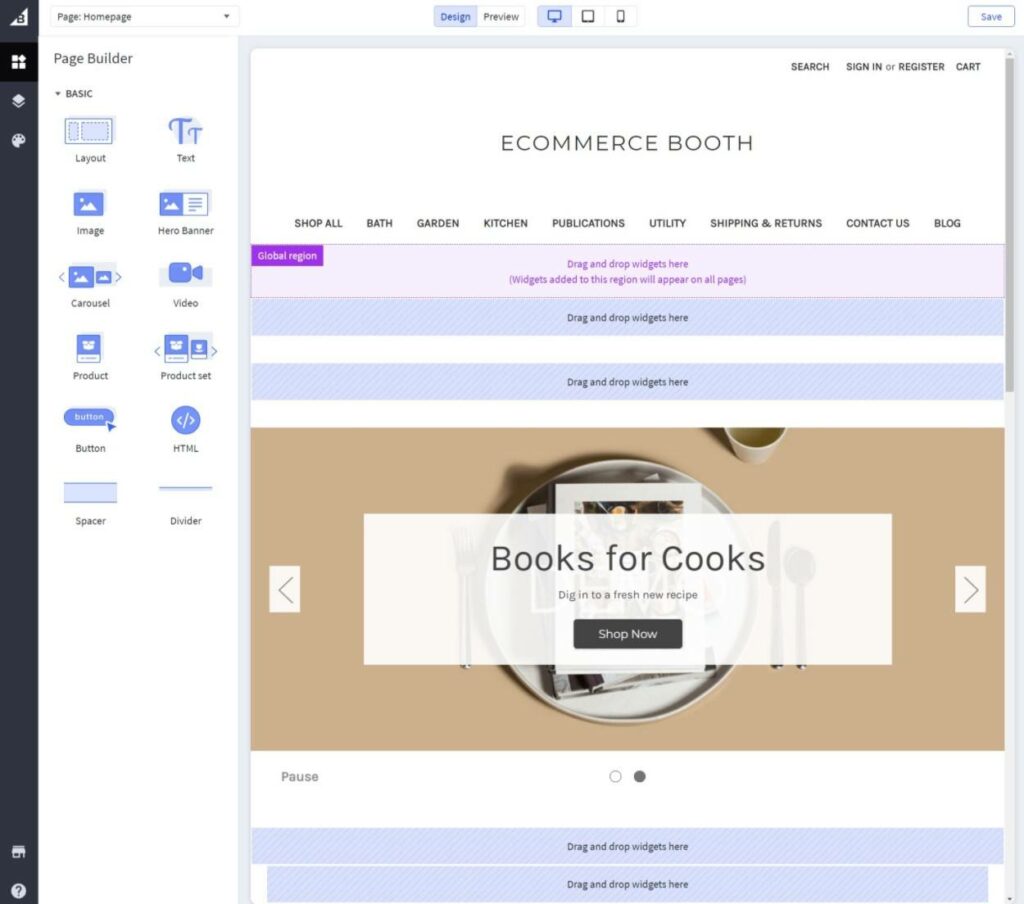
If you want to use BigCommerce as a headless commerce solution with WordPress, you can also use WordPress themes to control the frontend design of your store. You can even find some dedicated WordPress BigCommerce themes, such as the Shoptimizer theme.
Apps/Plugins and Integrations
BigCommerce hosts an official app marketplace to help you extend your store. It doesn’t have nearly as many options as Shopify or WooCommerce, but you can find a few hundred apps to help you add features to your store or integrate with other services.
Support
BigCommerce has a great support policy – you can get 24/7 help via phone, live chat, or email.
There’s also a detailed knowledge base for self-help.
Pricing
BigCommerce’s pricing depends on whether you’re interested in the Essentials edition or the Enterprise edition. The Essentials option should work for most solopreneurs and small businesses, while the Enterprise option is obviously focused on larger enterprises.
The Essentials plans are priced pretty much identically to Shopify. You also get a one-month free trial (no credit card required):
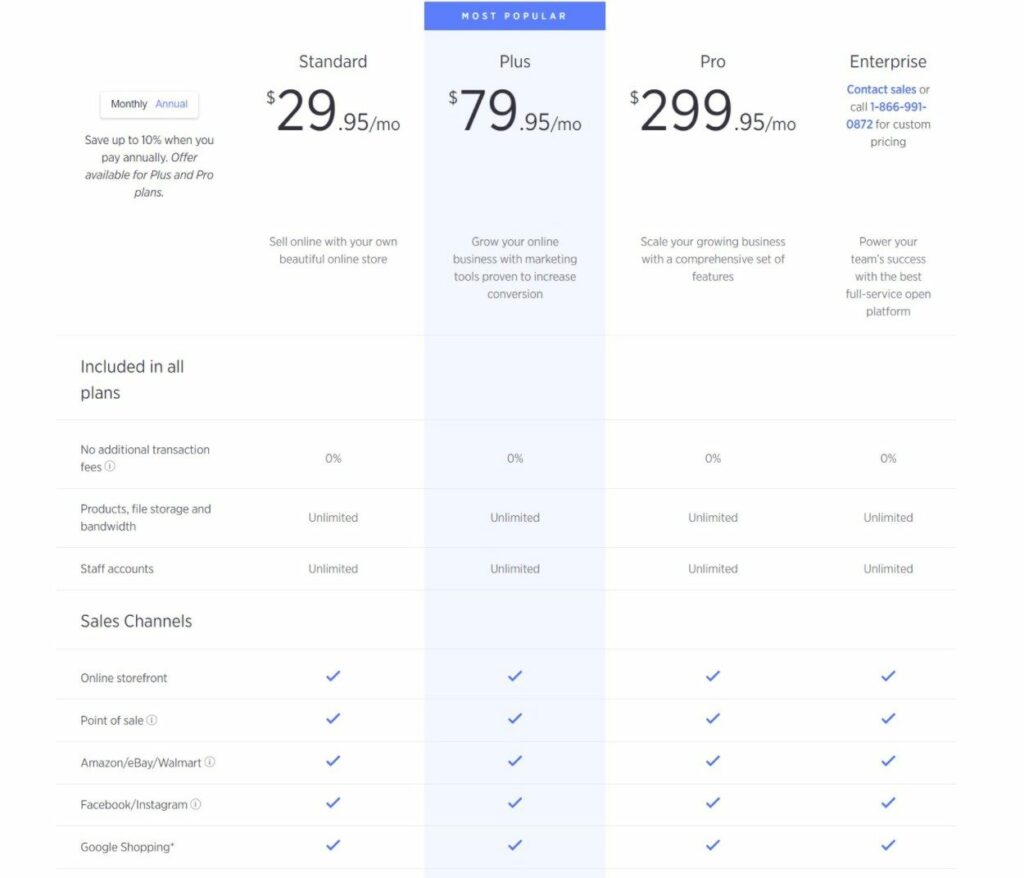
Unlike Shopify, BigCommerce doesn’t charge an extra transaction fee for using a custom payment gateway.
However, you should note that the Pro plan’s price only supports stores with up to $400k in annual sales. Beyond that, you’ll pay an extra $150 per month for each additional $200k in sales. So if you have $600k in sales, you’d pay ~$450 per month.
For the Enterprise plans, you’ll need to talk to sales, but expect to pay $1,000+ per month.
Pros
- BigCommerce’s headless approach gives you a lot of flexibility for your store’s frontend display if needed.
- Dedicated plugins for WordPress and Drupal that let you use those popular open-source tools as your store’s frontend.
- BigCommerce is great for multi-channel selling.
- No added transaction fees for using different payment gateways like Shopify charges.
Cons
- For basic stores, Shopify is probably a better option. BigCommerce is a more niche tool for people who need its flexibility.
- BigCommerce charges an extra fee if you exceed $400k in yearly sales.
4. Wix
| Overall | Ease of Use | Features | Themes | Apps | Pricing/Value |
| 4 | 5 | 4 | 4 | 3.5 | 5 |
Basic Approach
Wix is a SaaS hosted website builder that helps you create any type of website, including an eCommerce store.
That’s the key difference between Wix and Shopify/BigCommerce:
Wix can help you build other types of websites beyond just eCommerce.
This approach can be useful if you want your eCommerce store to be just a part of your website. For example, you could build a membership community with Wix and then also add a store. Or, you could add a merch store to your band’s website, and so on.
If your site is always going to be 100% focused on eCommerce, you might want to go with a dedicated eCommerce solution like Shopify. But if you value having the flexibility to build different types of sites, Wix could be a better option for you.
Interface Experience
When you first sign up for Wix, it will launch an onboarding wizard to help you choose the features that you want for your site. In addition to choosing eCommerce functionality, you can easily add more functionality:
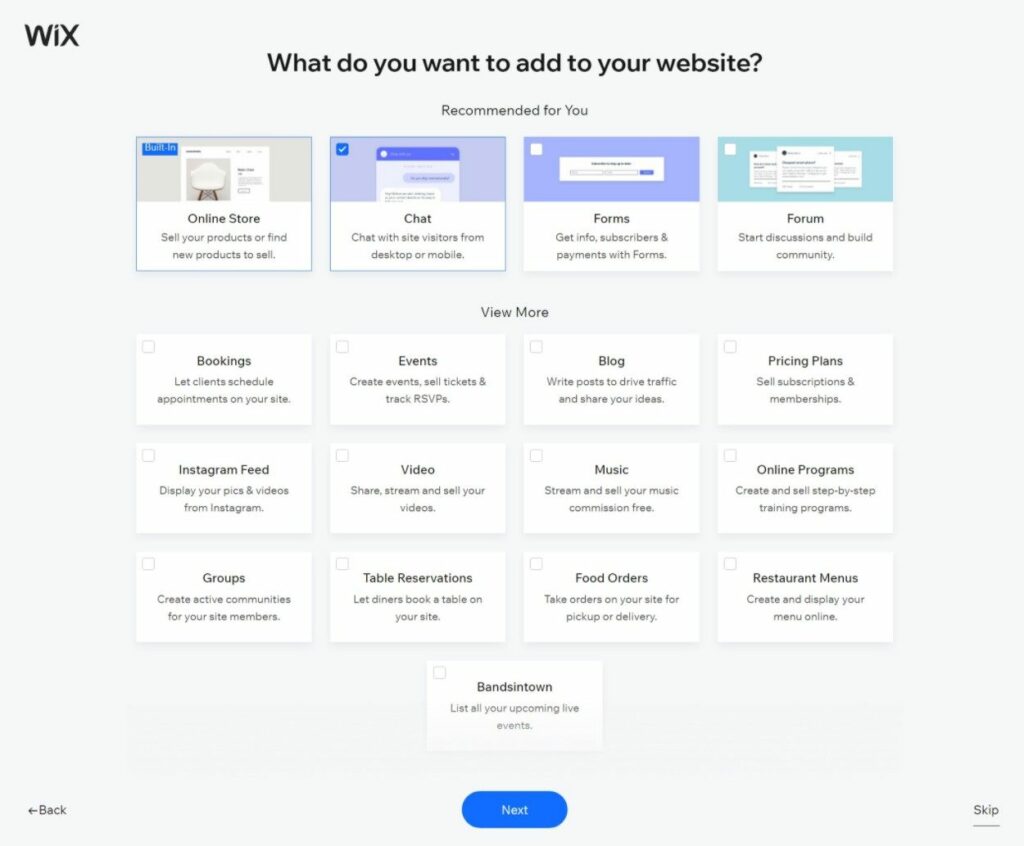
You can then either design your site yourself or let Wix’s artificial intelligence tool do it for you.
Wix will then drop you into the Wix editor, which is where you can customize the design of your template:
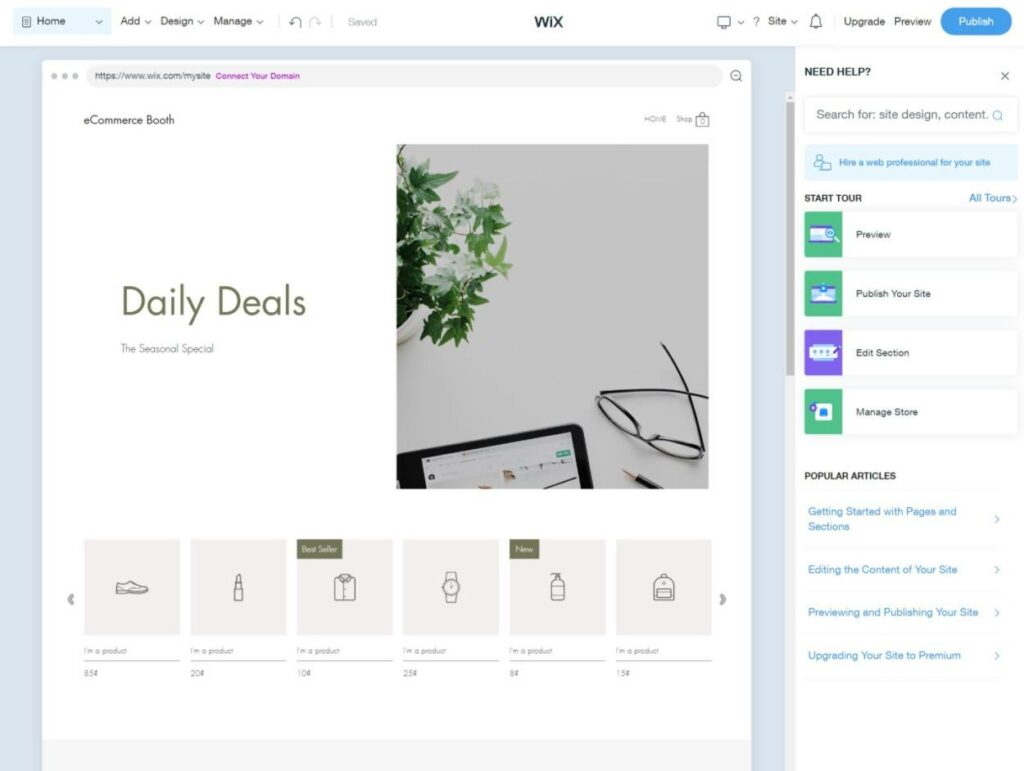
To manage the eCommerce functionality, you need to open the Online Store app. This will open a popup where you can manage all aspects of your store:
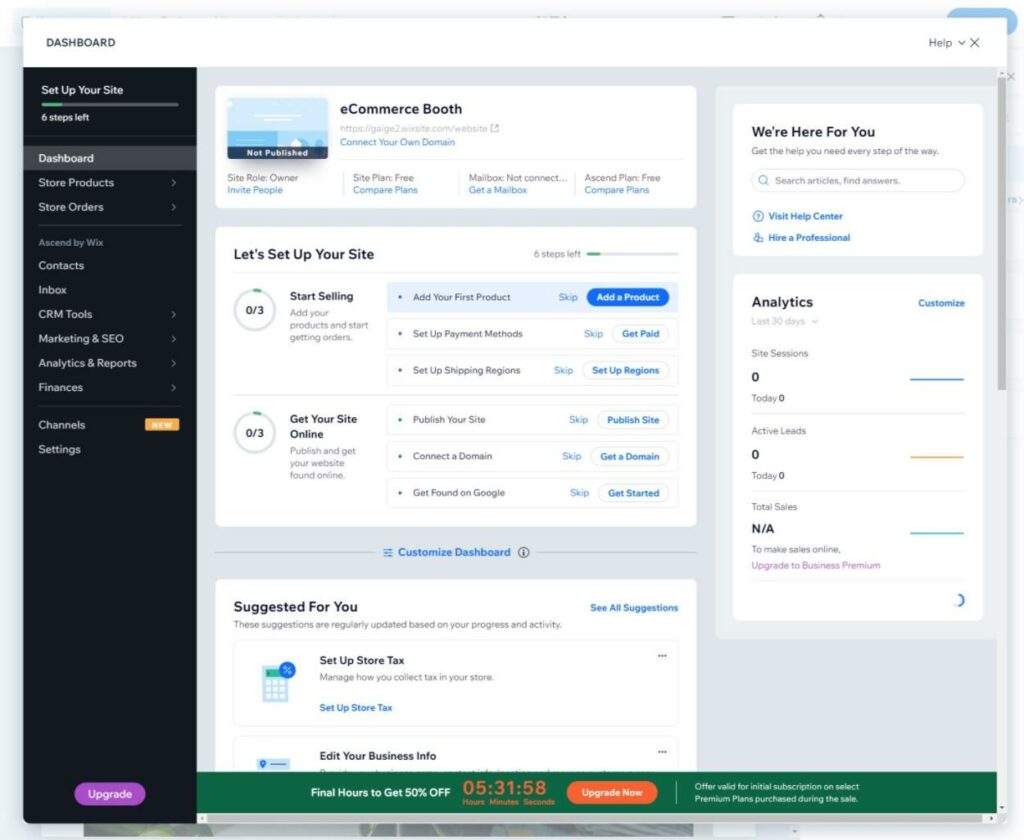
The fact that it’s a popup does make it seem a bit like an “add-on” rather than the focus of your site, which again, could be a good thing or a bad thing depending on your goals.
To add products, you can use a well-designed interface like this:
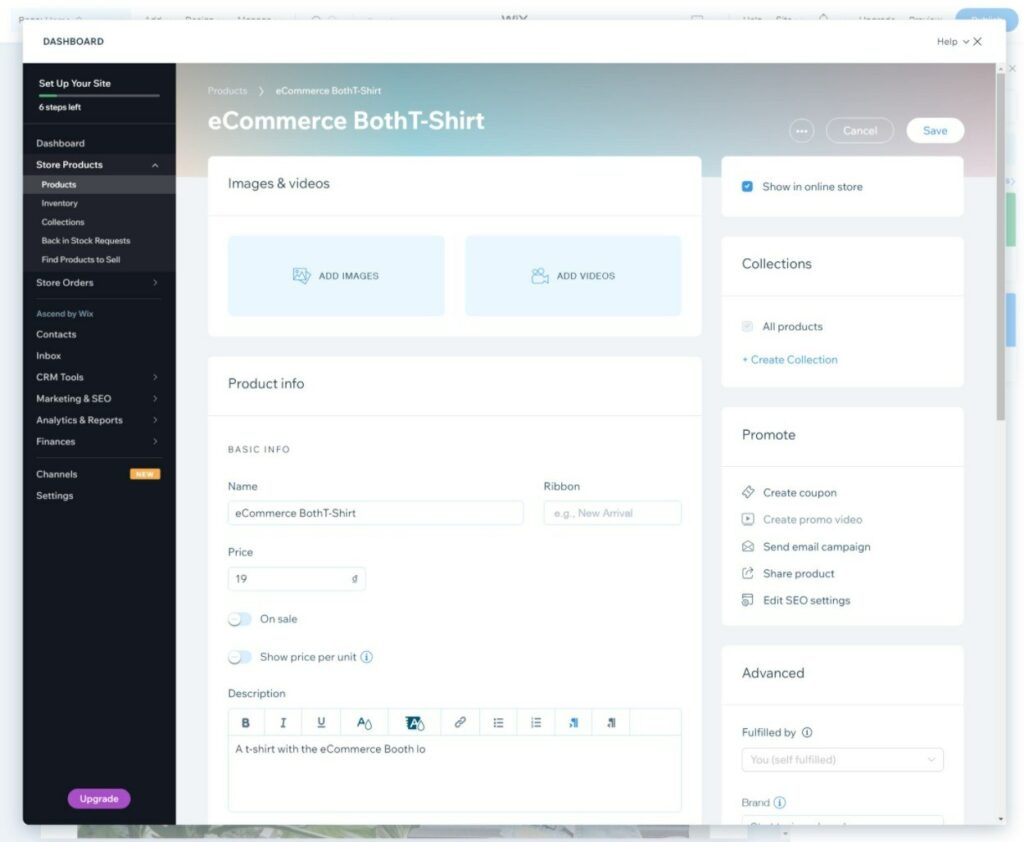
Themes/Templates
Wix’s official template marketplace offers over 800 different options, though not all of them are focused on eCommerce.
To customize your template, you can use Wix’s visual, drag-and-drop editor, which you saw in the screenshot above.
If you want more options, you can also purchase Wix eCommerce themes from third-party developers.
Apps/Plugins and Integrations
Wix is ok but not great when it comes to apps and integrations. Wix maintains an official app marketplace that contains 250+ apps. This gives you a good amount of flexibility, but it’s nowhere near what Shopify or WooComemrce offer.
Still, you will find plenty of useful tools for accounting integrations, dropshipping, shipping/fulfillment, and more.
Support
Wix offers support in nine different languages, which is great if you’re not a native English speaker. English, Spanish, and Portuguese support are all available 24/7, while other languages have limited availability:
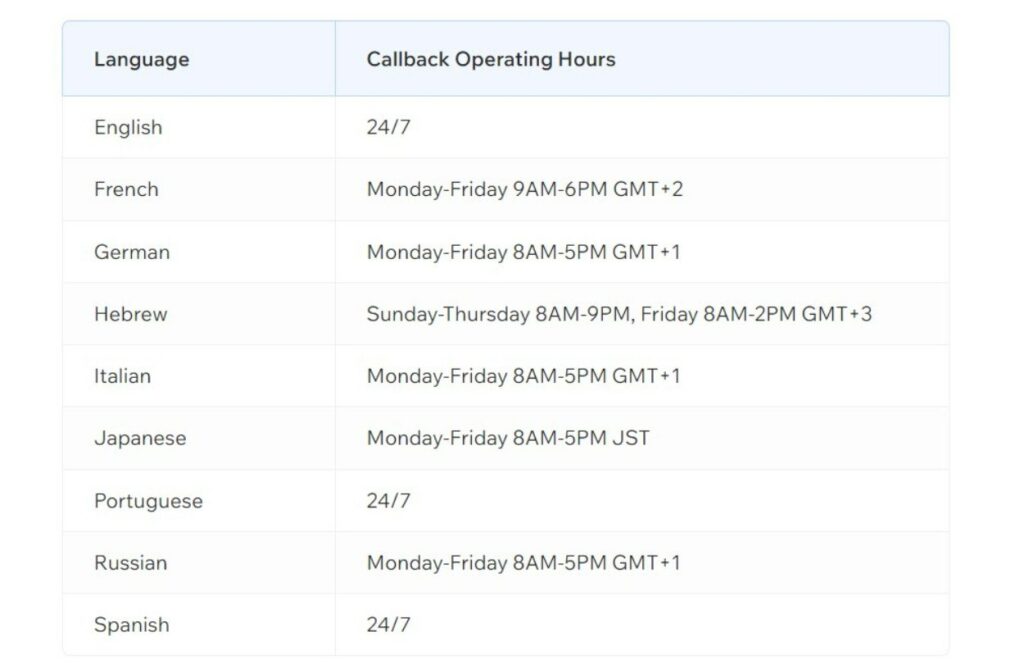
There’s also a detailed knowledge base for self-help.
Pricing
Wix offers three eCommerce plans, starting at just $17 per month. This makes it one of the cheapest eCommerce platforms that you’ll find. You can also test it out with a 14-day free trial.
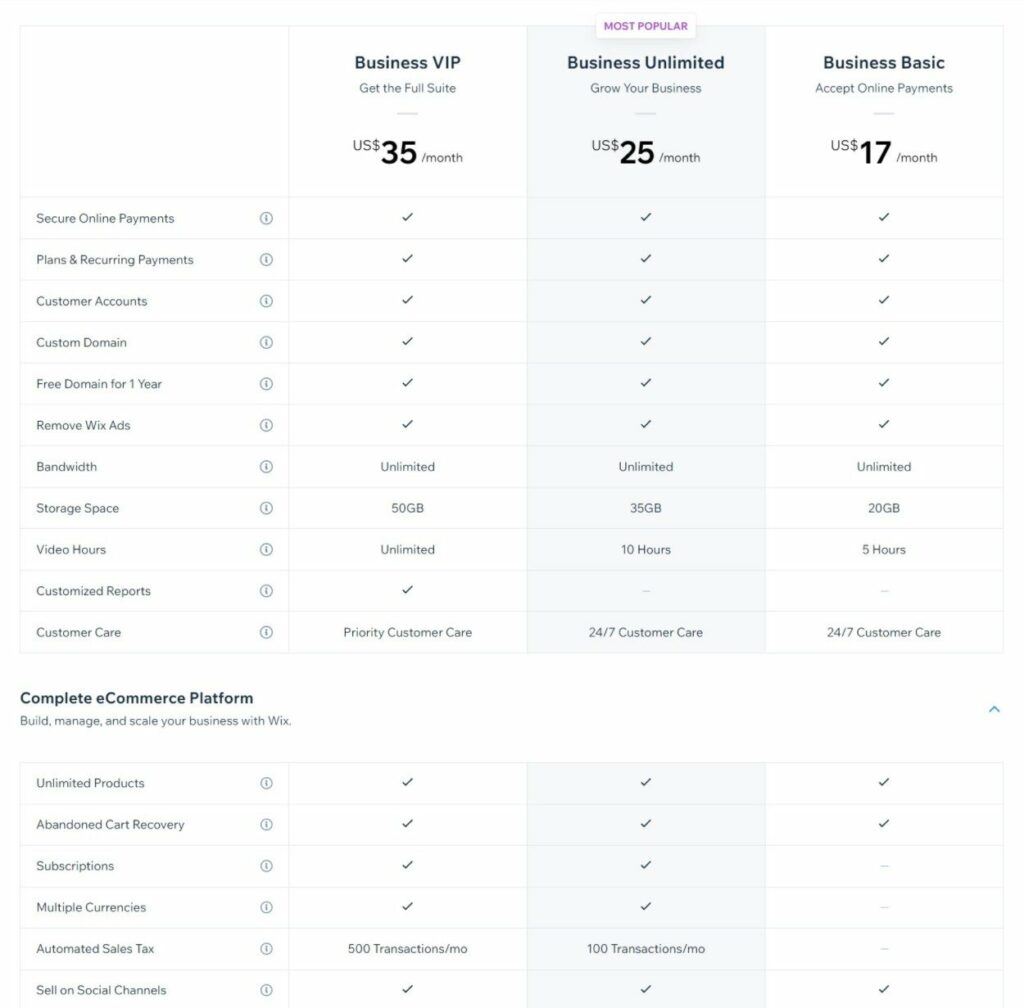
Pros
- Can build more than just eCommerce stores.
- One of the cheapest eCommerce platforms out there.
- Has a solid collection of templates and apps.
Cons
- eCommerce features are not as robust as a dedicated eCommerce platform.
- Wix makes it hard to migrate your data if you ever want to switch eCommerce platforms in the future.
5. Squarespace
| Overall | Ease of Use | Features | Themes | Apps | Pricing/Value |
| 4 | 5 | 3 | 3.5 | 2 | 5 |
Basic Approach
Squarespace is a hosted website builder that also offers full eCommerce functionality. It uses the same basic approach as Wix, so we won’t rehash what we covered with Wix.
One unique thing about Squarespace is that it has a very specific aesthetic. As we mentioned in the introduction, we think that Squarespace’s aesthetic is designed to work well if you’re selling the types of products that do well on Etsy.
Interface Experience
The main Squarespace dashboard shows a live preview of your site with a sidebar on the left to manage different areas. To access the eCommerce features, you’ll go to the Commerce tab:

The Commerce area is well-designed and generally very pleasant to work in:
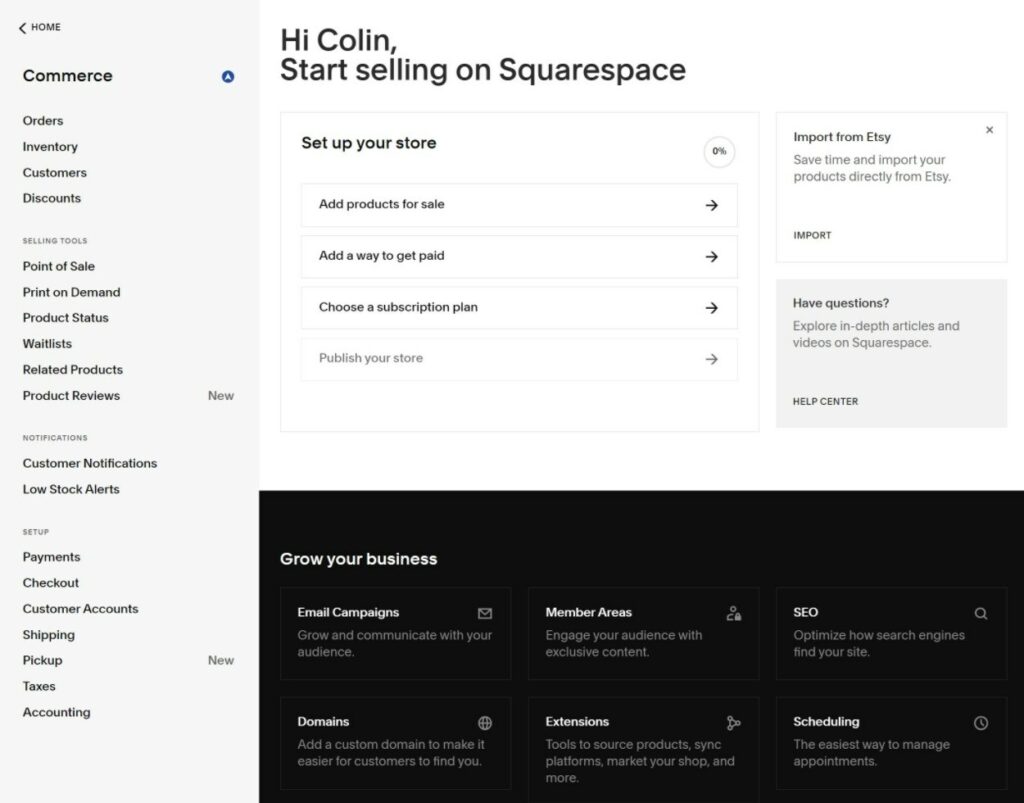
When you add a product, you get a very streamlined interface:
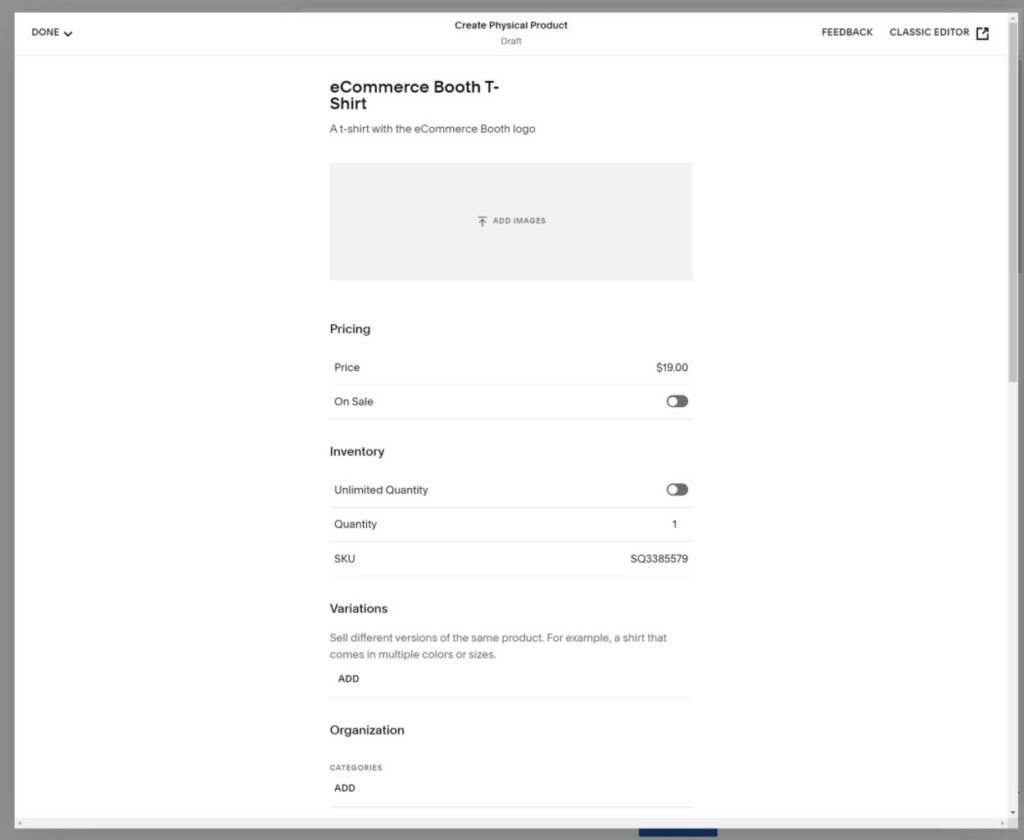
You’ll get other areas to manage your store’s orders, customers, inventory, and so on.
Themes/Templates
Squarespace offers a small number of free eCommerce templates that you get as part of your subscription. Squarespace templates definitely have a certain “aesthetic” with minimal designs and a focus on large imagery.
To customize your template, you can use Squarespace’s visual, drag-and-drop editor:
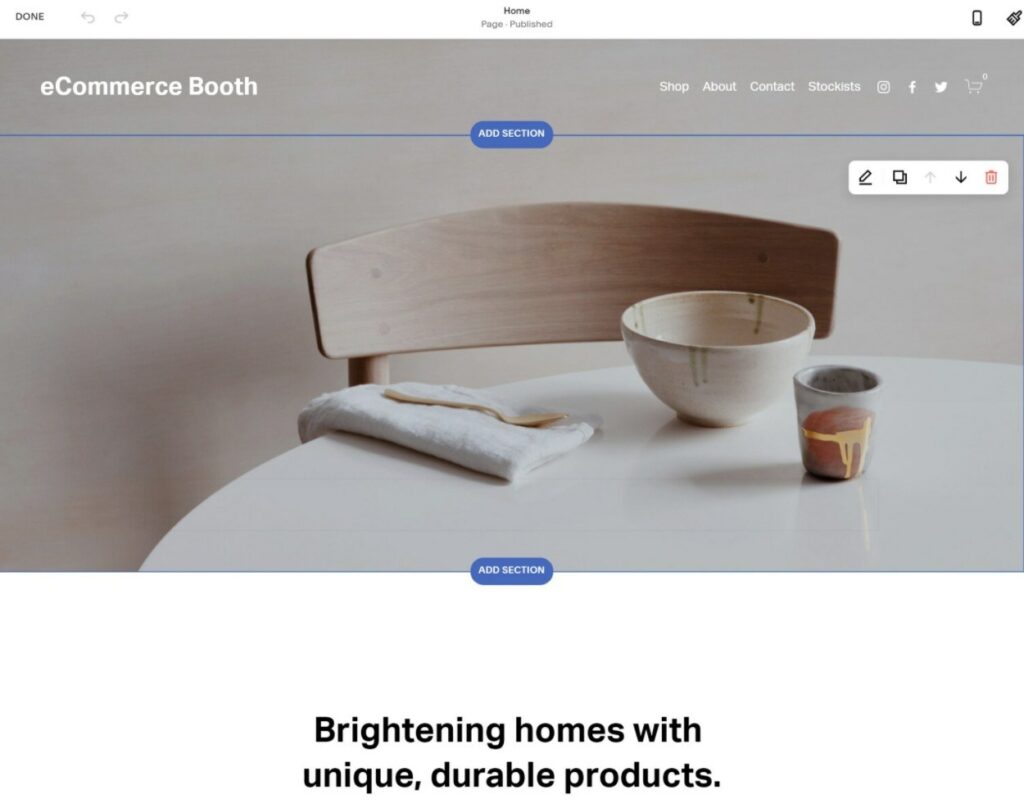
If you want more flexibility, you can also purchase third-party Squarespace templates from independent sellers.
Apps/Plugins and Integrations
Squarespace is quite limited when it comes to apps and integrations with other tools, which is one of its downsides. For a long time, Squarespace didn’t even allow third-party extensions. That’s changed now, and Squarespace does maintain a Squarespace extensions library.
However, your options are still more limited than all of the other eCommerce tools on this list.
Support
Squarespace offers direct support whenever you need help, You can reach out via email or live chat – there’s currently no phone support option. Email support is available 24/7, but live chat support is only available Monday-Friday from 4 AM to 8 PM EST.
Squarespace also offers a detailed knowledge base for self-help.
Pricing
Squarespace offers two eCommerce plans:
- Basic Commerce – $35 per month paid monthly or $26 per month paid annually.
- Advanced Commerce – $54 per month paid monthly or $40 per month paid annually.
There’s also a 14-day free trial to test it out:
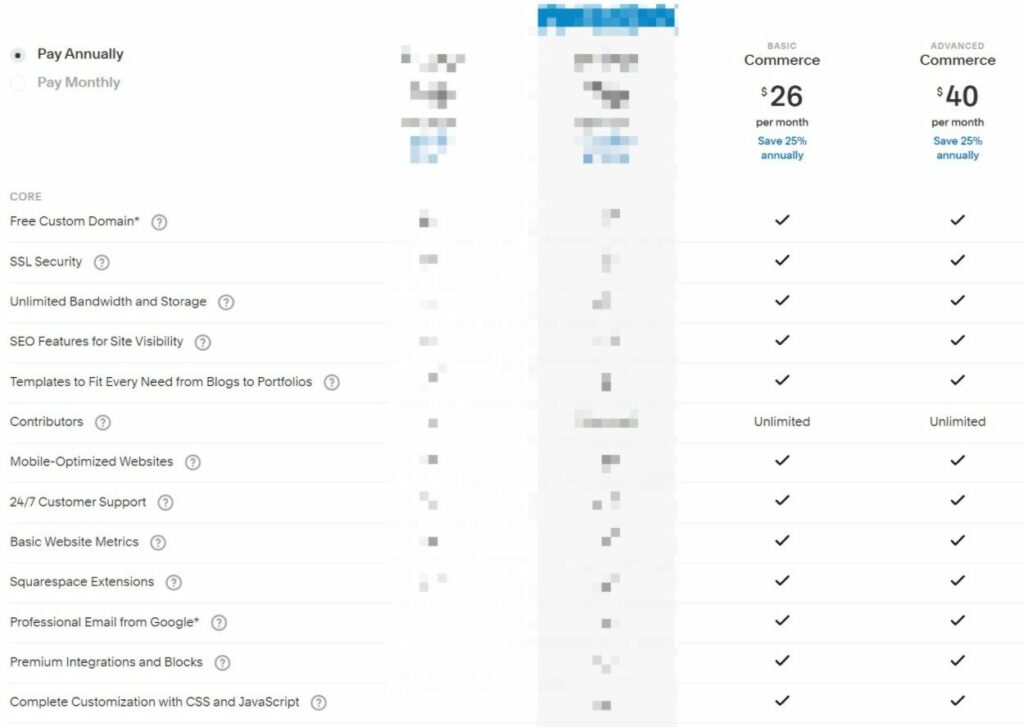
Pros
- Can build more than just eCommerce stores.
- Very popular with creatives, which could be a good match if you want to launch a creative eCommerce store.
- Affordable, with flat and predictable pricing.
Cons
- Squarespace’s eCommerce functionality is just generally not as robust as a dedicated eCommerce platform like Shopify.
- Limited selection of eCommerce templates, extensions, and integrations as compared to other platforms.
- Live chat is not 24/7 (though email support is).
How to Choose the Best eCommerce Platform: A Detailed Guide
Here’s the tricky thing about choosing the best eCommerce platform:
There’s no single “best” platform that’s going to be the right pick for every single store.
Instead, choosing the right solution for your store will depend on your needs, knowledge level, budget, and so on.
So – to account for that, we’re going to make different recommendations depending on what you’re looking for.
You can click the links below to jump straight to the relevant section:
- 🥇 Best for most stores – 🏆 Our pick: Shopify
- 🏪 Best for small business or startups – 🏆 Our pick: Shopify
- 🏗️ Best for maximum flexibility – 🏆 Our pick: WooCommerce
- 🎚️ Best for multi-channel selling – 🏆 Our picks: BigCommerce or Shopify
- ✈️ Best for dropshipping – 🏆 Our picks: Shopify or WooCommerce
- 🛍️ Best for small, casual stores – 🏆 Our picks: Squarespace, Shopify, or Wix
- 🌎 Best for international sales – 🏆 Our picks: WooCommerce or Shopify
- 🤯 Best for headless commerce – 🏆 Our pick: BigCommerce
- 💼 Best for B2B selling – 🏆 Our picks: WooCommerce, BigCommerce, or Shopify
- 📓 Best for adding a store to an existing site – 🏆 Our picks: WooCommerce, Squarespace, or Wix
Best eCommerce Platform for Most Stores
If you have no idea where to start, Shopify is the overall best place for most people to launch an eCommerce store.
If the average person came to us and asked us the best place to launch a store without providing any other details, we would tell them Shopify.
Why Shopify? Because it does everything pretty well. There are specific areas where other platforms surpass Shopify, but as an all-around eCommerce platform that does the things most people need, it’s tough to beat.
Basically, unless you fit into one of the more narrow scenarios below, you should probably choose Shopify for your store.
Best eCommerce Platform for Small Business or Startups
If you’re a small business or startup, we also recommend going with Shopify for the same reasons above, unless you fit into a more specific scenario below.
Best eCommerce Platform for Flexibility
If you want the eCommerce tool that offers the most flexibility, you won’t beat WooCommerce.
Again, WooCommerce is self-hosted, open-source software, which gives you a level of flexibility that no closed-source SaaS tool will be able to match.
You get an absolutely massive plugin marketplace to extend your store. And if that’s not enough, you can always edit every part of your store’s underlying code.
WooCommerce also just generally doesn’t place arbitrary limits on your store. For example, Shopify limits you to 100 variants per product, while WooCommerce will never place those arbitrary limits on your store*.
Do most stores need more than 100 variants? Probably not. But if your store does, you’ll appreciate that WooCommerce lets you do what’s needed.
*to avoid nit-pickers, we will say that WooCommerce does apply a 50 variant limit by default. But you can easily change this to any number with a short code snippet, which again demonstrates the usefulness of being able to access your store’s underlying code.
Best eCommerce Platform for Multi-Channel Sellers
If you’re selling via multiple channels such as your own website, Amazon, eBay, in-person, and so on, then you’ll want an eCommerce platform that lets you collect all those different sales channels in one spot.
Of these platforms, we think that BigCommerce is the best option for multi-channel selling because it’s had that focus from the beginning. You can easily connect to all the popular platforms, including social media and various in-person POS systems.
Shopify is also another good option here as it also lets you add multiple sales channels. So if you value Shopify’s other features, you might want to choose it over BigCommerce.
Best eCommerce Platform for Dropshipping
If you specifically want to create a dropshipping business, you should go with either Shopify or WooCommerce. Both are well-suited to dropshipping and include lots of extensions to help you easily integrate with dropshipping providers such as AliExpress.
With Shopify, you get Oberlo (which Shopify acquired) and a number of other dropshipping apps.
With WooCommerce, you get popular dropshipping plugins like AliDropship, WooDropship, and more.
There are also cross-platform dropshipping apps that work with both. For example, Dropified works with both WooCommerce and Shopify (as well as BigCommerce).
Related: Dropified vs Oberlo comparison
All of the platforms on this list do support dropshipping (even Wix and Squarespace), but WooCommerce and Shopify are the strongest.
Best eCommerce Platform for Small, Casual Stores
If you have a small, casual store, we recommend Squarespace if your store fits the Squarespace aesthetic. If not, consider Shopify or Wix.
Best eCommerce Platform for International Sales
If you want to create an international store that’s available in multiple languages, WooCommerce is the best option because WordPress does multilingual sites really well. You can find some really convenient translation plugins like TranslatePress or Weglot.
Shopify also supports multiple languages, though you’re limited to five total languages on the regular plans. You’ll also probably want a translation app to simplify translating your content.
Best eCommerce Platform for Headless Commerce
If you’re interested in headless commerce, BigCommerce is the best option on this list. It has an “API first philosophy” that makes it easy to set up your own tech stack. BigCommerce also offers dedicated integrations for WordPress and Drupal that lets you use those popular CMS tools as your store’s frontend.
Best eCommerce Platform for B2B Sales
If you’re selling B2B (business to business), you’ll have different needs than a B2C store (business to consumer).
Because you might need heavy-duty customization, WooCommerce is always going to be a great B2B eCommerce platform. With plugins or custom code edits, you can make WooCommerce work pretty much however you need it to.
Shopify also offers a B2B platform if you upgrade to Shopify Plus. This can also be a good option, but it’s pricey because it costs $2,000 per month minimum.
Finally, BigCommerce also recently released a BigCommerce B2B Edition that comes with B2B-specific features. However, like Shopify Plus, you’ll pay a premium for it.
Best Platform to Add a Store to An Existing Site
So far, I’ve assumed that you specifically want to create an eCommerce store. But what if you want to make your eCommerce store just a part of a non-eCommerce site?
For example, maybe you want to add a merch store to an existing site. The merch store isn’t the focus – it’s just an accessory to the site.
Or, maybe you have an artist’s portfolio and you’re looking to sell some of your work via your portfolio.
In these situations, going with a full eCommerce platform like Shopify might be overkill. Instead, consider Squarespace or Wix. Or, WooCommerce can also work well.
Launch Your Store Today
That wraps up our big roundup of the best eCommerce platforms to launch a store in 2023 and beyond.
We hope that by highlighting specific use cases, you should have a good idea of how to pick the right platform for your specific situation. And if you’re still in doubt at this point, we recommend just starting with Shopify.
Do you still have any questions about where to launch an online store? Let us know in the comments!

Hello,
Could you let me know if you design online stores, and if so, on what platform? WooCommerce, Shopify, etc.?
Thanks,